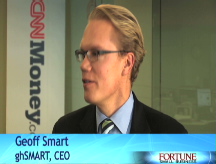The art of the hire
Good employees are hard to find, but this roadmap can help.

(Fortune Small Business) -- Anne Messenger's hair stood on end as she read her former administrative assistant's Facebook profile. The picture showed the woman in a sultry pose, smoking a cigarette. Her main interests? Men and drinking. Yet in her interview, the candidate had seemed personable and energetic. The position included bookkeeping and her math skills were a little subpar, but she could brush them up on the job, right?
Wrong. Soon after Messenger hired her, the new assistant started making serious mistakes. The company books were a mess and bills were going unpaid, says Messenger, CEO of Messenger Associates, a career and human resources consulting firm based in Binghampton, N.Y. The nightmare assistant didn't stick around for long, but if she had, the company's revenues might have suffered significantly. And that was all before Messenger discovered her appalling Facebook profile.
Almost 50% of entrepreneurs make serious mistakes when hiring, says management consultant Geoff Smart, CEO of ghSMART and co-author of the hiring guide Who. The lethal combination of time pressure and inexperience leads many owners to make mistakes that can be very costly for a new or growing small business. So where do you start?
How to find good candidates
First, leverage your professional network. Bob Wendover, managing director for the Center for Generational Studies in Denver and the author of several books on hiring, starts by asking his current employees to suggest suitable candidates.
"Like people tend to attract each other," Wendover says. "A good worker might know other talented people who are looking for a job."
Smart recommends compensating your employees for recommending job candidates who get hired, a technique that Wendover also uses. You can also try job search engines such as Monster.com or CareerBuilder.com, but Wendover cautions that they aren't always the best option for busy owners who don't have much time to sift through piles of resumes. After posting a recent position on Monster (MNST), Wendover received 40 resumes in a space of four hours.
"Of those 40, there were maybe four that I was actually interested in," he said.
You can certainly hire a reputable recruiting firm to do the work for you, but many small firms can't afford to pay the stiff fees that headhunters typically charge. "I don't think it's worth it," Bob Wessel, vice president at Payroll Control Systems in Minneapolis said. "I don't see spending 30% to 35% of a new employee's starting annual salary as a value to a small business."
Whatever method you use to identify candidates, it's vital to understand exactly what you're looking for. At the start of every recruiting effort, Wendover uses a whiteboard to list necessary skills, such as service demeanor, organizational ability, written communications, and design chops. He then ranks the skills from most important to least important.
"When I start looking, the successful person will have at least the top three. The next six are somewhat negotiable," he says.
Smart recommends that you compile what he calls a Score Card, a list of things that you want the person to actually accomplish: bring in new clients, build revenues, improve customer service, or what have you. "If you don't write it down, you'll end up hiring the wrong person," he said.
How to interview
Once you've identified a few worthy candidates, then comes the next daunting task: interviewing and reference checking. Entrepreneurs wear many hats and especially at a growing business, they often need to fill vacant positions yesterday, if not sooner. But patience is an important virtue in hiring.
"If you're going to pay them $30,000 a year plus benefits and workers compensation, you're talking at least a $100,000 investment," says Wendover. "Would you only spend two or three hours making a $100,000 investment if you were buying a computer or some other large piece of equipment? No, but that's what we tend to do."
During the interviewing process, Smart recommends avoiding hypothetical questions, such as "How would you deal with an office conflict?" It's easy to lie or exaggerate when answering a hypothetical. So instead of asking how the candidate would deal with conflict, ask her to explain how she resolved an actual conflict at her previous job. At least in some cases, you can verify the answer by calling her references.
Other red flags to watch out for in a job interview, according to Smart: Candidates who tend to blame others for mishaps, candidates who can't explain job moves, and candidates who speak badly of their former bosses.
"The more you know about a candidate, the better your chances are of putting the right guy in the right place," says Paul Lattanzio, a venture capitalist at Bear Growth Capital Partners in New York City who also sits on several small company boards.
Lattanzio recommends that you ask all candidates this question: "Who was your last boss and what would he say about you?" The answer is often verifiable. And asking the candidate's former boss to comment will give the boss a chance to speak on a topic that she might not otherwise bring up during a reference check conversation.
How to check references
Of course, some employers are so fearful of getting drawn into wrongful termination suits that they will only give out titles and dates of employment of a former employee. And not even a thorough reference check will reveal everything you need to know about the candidate. It's often a good idea to pay for a thorough background investigation, especially when you're hiring someone who will be dealing with money, says Carol Fletcher, CEO of C.R. Fletcher Associates in Syracuse, N.Y.
-
The Cheesecake Factory created smaller portions to survive the downturn. Play
-
A breeder of award-winning marijuana seeds is following the money and heading to the U.S. More
-
Most small businesses die within five years, but Amish businesses have a survival rate north of 90%. More
-
The 10 most popular franchise brands over the past decade -- and their failure rates. More
-
These firms are the last left in America making iconic products now in their twilight. More










